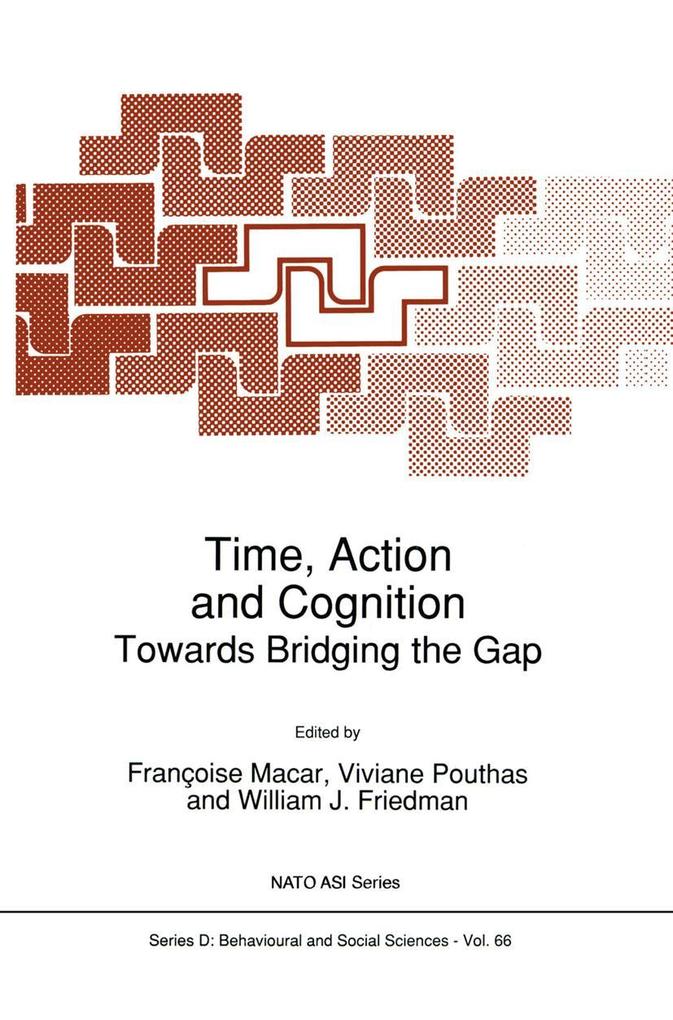
Zustellung: Mi, 16.07. - Sa, 19.07.
Versand in 7 Tagen
VersandkostenfreiBestellen & in Filiale abholen:
This volume is the outcome of the NATO Advanced Research Workshop on Time, Action and Cognition. which was held in Saint-Malo, France, in October 1991. The theme - time in action and cognition of time - was sparked by growing awareness in informal meetings between mostly French-speaking time psychologists of the need to bring together time specialists in the areas of development, motor behavior, attention, memory and representations. The workshop was designed to be a forum where different theoretical points of view and a variety of empirical approaches could be presented and discussed. Time psychologists tended to draw conclusions restricted to their specific fields of interest. From our own experience, we felt that addressing a common issue - possible relationships between time in action and representations of time - could lead to a more comprehensive approach. We are endebted to NATO for allowing us to bring this idea to fruition. We take this opportunity as well to express our thanks to Cognisciences ( Cognisud section) -- an active interdisciplinary research organization - for its financial backing and the CNRS for its scientific support.
Inhaltsverzeichnis
Questions on the interconnections between enacted and represented time. - Introduction: Time concepts and adaptation: Developmental approaches. - Review Paper: The development of the concept of time in children: An integrative model. - The development of temporally-based intersensory perception in human infants. - Changes in temporal regulation of behavior in young children: From action to Representation. - The development of a diachronic perspective in children. - The development of children s representations of temporal structure. - Short Communication: Children s understanding of the temporal relationship before/after. - Short Communication: Time, kinematic reasoning and cognitive interaction. - Short Communication: Time and inference rules in the child, adolescent and adult. - Introduction: Towards an understanding of subjective judgments of time. - Review Paper: Prospective and retrospective judgments of time: A neurobehavioral analysis. - On prospective time estimation, temporal relevance and temporal uncertainty. - Dividing attention between temporal and nontemporal tasks: A Performance perating Characteristic -POC- analysis. - Attention, multiple timing, and psychophysical scaling of temporal judgments. - Prospective and retrospective duration judgment: The role of information rocessing and memory. - The incidental learning and remembering of event durations. - Time memory and time perception. - short Communication: Testing models of time estimation. - Short Communication: Time estimation and attentional sharing. - Introduction; Models of timing-with-a-timer. - The internal clock revisited. - Counting the minutes. - Oscillators, predictions and time. - A mechanism for timing conditioned responses. - Introduction: Response timing and synchronization. - Review Paper: Determinants oftiming in serial movements. - Can duration he a relevant dimension of motor programs? . - The error correction model for the tracking of a random metronome: Statistical properties and an empirical test. - Tracking simple rhythms: On-beat versus off-beat performance. - Introduction: Representing time. - Review Paper: Dynamic representations guiding adaptive behavior. - Duration experience under conditions of suspense in films. - Words for time. - Verisimilar and metaphorical representations of time. - The short life of metric time. - Conclusion: From action to cognition: Bridging the gap? . - Invited Address: From time lost to time regained. - Author Index.
Produktdetails
Erscheinungsdatum
31. Mai 1992
Sprache
englisch
Auflage
1992
Seitenanzahl
430
Reihe
NATO Science Series D:
Herausgegeben von
William J. Friedman, Françoise Macar, V. Pouthas
Verlag/Hersteller
Produktart
gebunden
Abbildungen
XVIII, 408 p.
Gewicht
808 g
Größe (L/B/H)
241/160/28 mm
ISBN
9780792317838
Entdecken Sie mehr
Bewertungen
0 Bewertungen
Es wurden noch keine Bewertungen abgegeben. Schreiben Sie die erste Bewertung zu "Time, Action and Cognition" und helfen Sie damit anderen bei der Kaufentscheidung.








